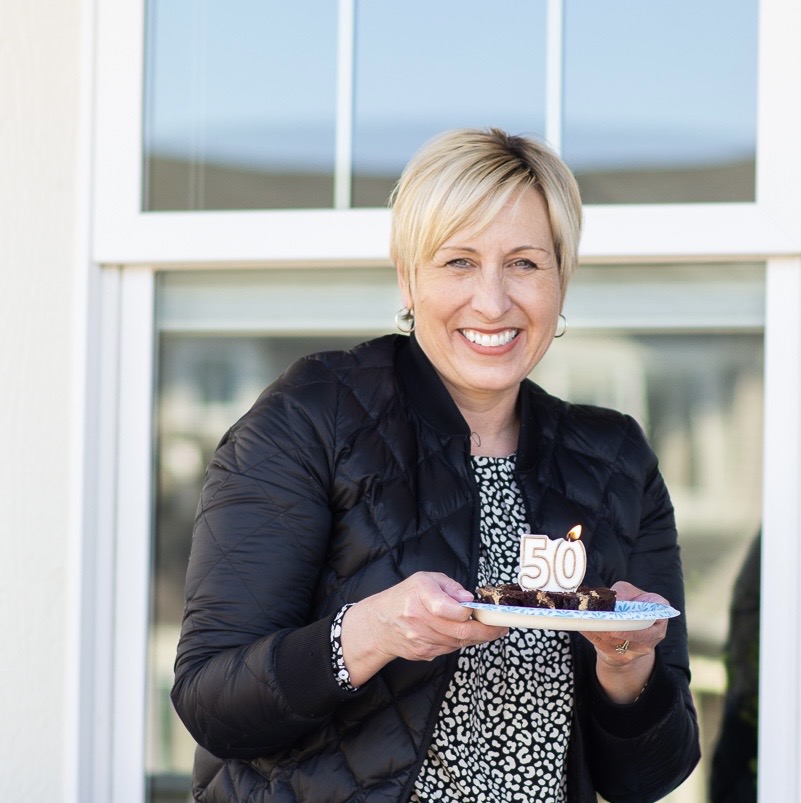#EyeGetDilated Diane’s Story

Guest Blog SUBMITTED BY
Diane
In October 2020, at the height of the pandemic, I finally scheduled an eye exam after more than a decade. Working from home, staring at a screen all day, I assumed I just needed “big-girl glasses.” I had just turned 50 a few months earlier, feeling healthy and busy, and like many people, I figured I would get around to routine appointments “someday.” For the first time ever, I agreed to add the Optomap imaging, even though insurance did not cover it. That forty-dollar decision changed my life.
The scan showed something unusual. My eye was dilated, and my optometrist referred me to an ophthalmologist “just to be safe,” noting that he often sent patients for a second look. A few days later, with my husband waiting in the car because of pandemic restrictions, the ophthalmologist told me I had a large tumor in my eye, and with calm urgency said, “You have uveal melanoma.” I was shocked. They quickly arranged for me to see an ocular oncologist in the same practice just three days later.
After reviewing my case and measuring the tumor, the ocular oncologist presented two treatment paths: surgical removal of the eye (enucleation) or plaque radiation therapy. I decided to proceed with plaque radiation, fully aware that my vision in that eye could be significantly altered or even lost. When surgery began to place the plaque, he discovered that the tumor had grown another 15 to 20 percent in just those three weeks. He was stunned by its aggressiveness and later told me that had he known it would grow that rapidly, he likely would have recommended enucleation from the beginning.
Plaque radiation therapy involves a gold-plated disc embedded with radioactive seeds that is sutured directly onto the eye for several days, tailored precisely to the tumor’s size. Because mine was larger than originally planned, the plaque had to remain in place an additional day to ensure the radiation could reach the entire tumor. He warned me that the extended radiation exposure might severely damage my eye and that there was still a chance I could need enucleation in the future. My mindset at the time was: here we are, we will take it step by step. I held onto both my faith and my hope.
The recovery was long and often painful, and the aftermath has included three years of complications: high eye pressure, ongoing glaucoma treatment, and frequent specialist appointments. My vision is limited, and the eye certainly does not look the same, however it is still mine. You absolutely can live a full, normal, beautiful life with one functioning eye.
Uveal melanoma is rare, diagnosed in only about five out of one million people. Although the primary tumor is local to the eye, this cancer can metastasize, most commonly to the liver, but also to the lungs and bones. There is currently no cure. Recent advances, including a few newly FDA-approved treatments, are helping prolong life, although research still lags behind due to the cancer’s rarity.
Because of the metastatic risk, I have ongoing monitoring with scans every six months. I work with both an ocular oncologist and a medical oncologist. I recently reached the milestone of five years post-diagnosis, something that felt impossible in those first terrifying months. The follow-ups continue, although I move forward with gratitude.
Looking back, I will never forget the expression on my ocular oncologist’s face when I told him my last eye exam had been ten to fifteen years earlier. There is so much that can be seen through a simple eye exam. When life is busy and everything seems fine, annual appointments are the first thing we push aside. I did too. I thought I was healthy. I took my eyesight and my body for granted.
The experience changed everything. In many ways, I see more clearly today with one eye than I ever did with two. I see what matters: slowing down, paying attention, appreciating the ordinary moments, celebrating the gift of another day. There are challenges, of course. Life does not stop being messy. Yet there is overwhelming blessing in being here to witness it all.
My family and friends have been an unbelievable source of support throughout this entire journey, lifting me up through the hardest moments and celebrating each milestone alongside me.
If sharing my story encourages even one person to stop delaying their routine exams, to listen to their body, to take charge of their health, then I believe this journey has purpose. Schedule that eye exam. Get your eyes dilated. Keep up with your medical checkups. Do not wait for something to go wrong. Caring for your health is not an inconvenience. It is an investment in the life and future you want to experience.
I wake up each morning thankful that I am here to say these words. Thankful for the doctors who caught something I could not see. Thankful for that $40 decision. Thankful for every single new day.



